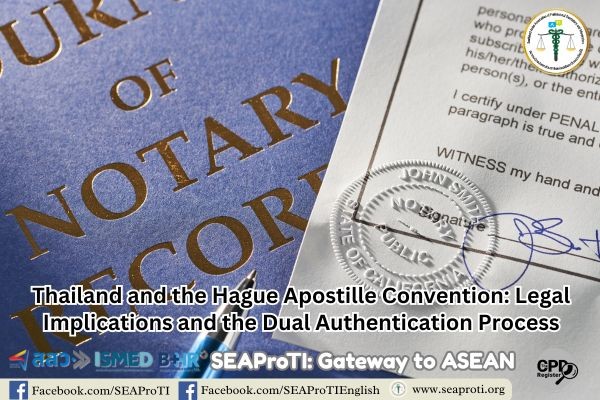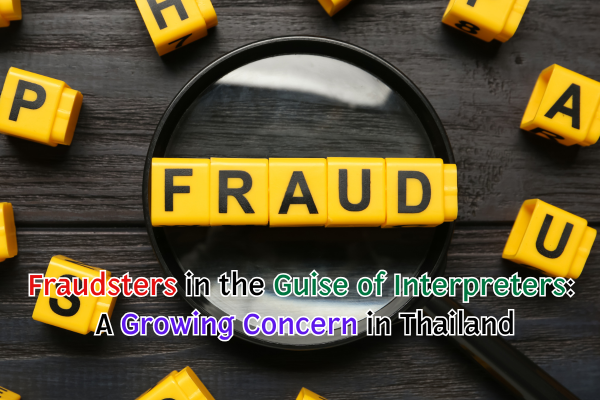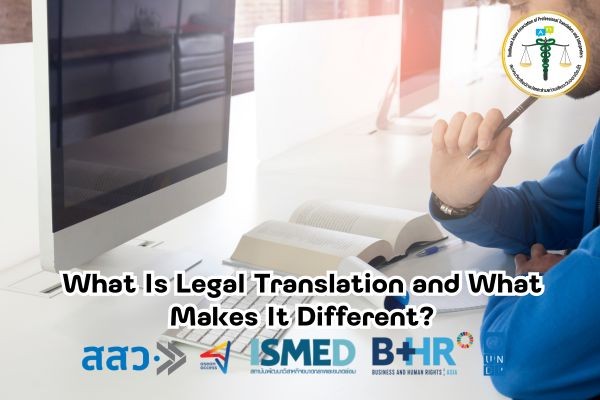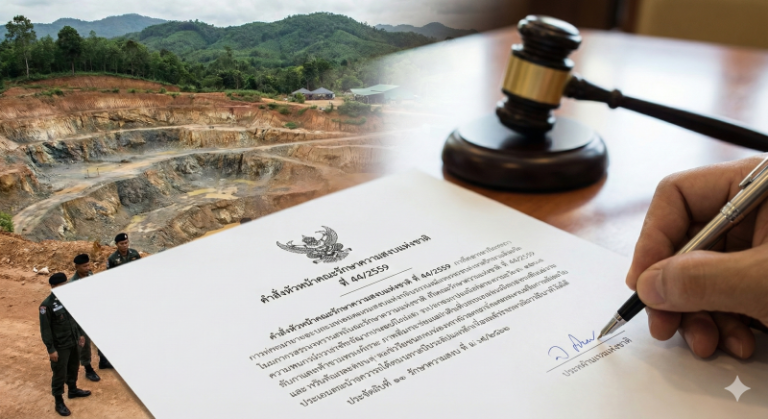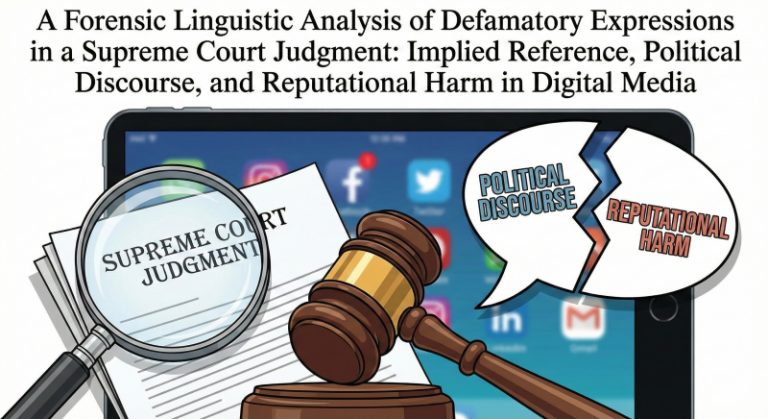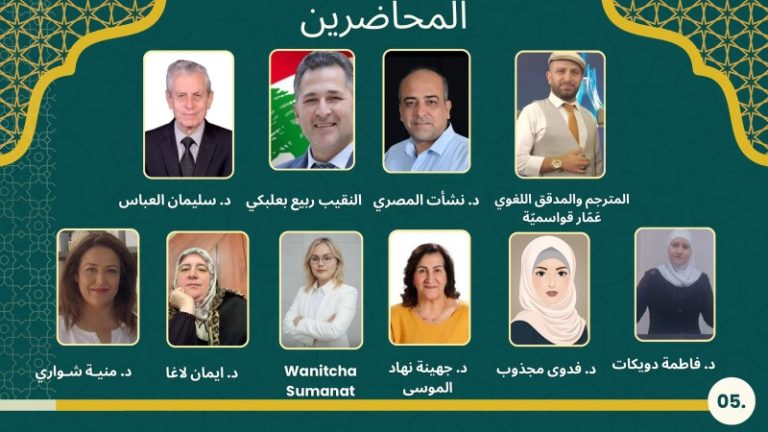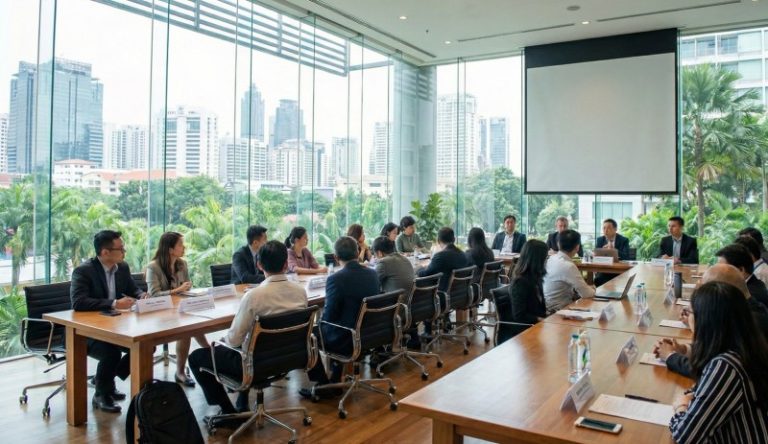Thailand and the Hague Apostille Convention: Legal Implications and the Dual Authentication Process
Author: Wanitcha Sumanat, President of Southeast Asian Association of Professional Translators and Interpreters (SEAProTI)
4 November 2025, Bangkok – Since Thailand has not yet acceded to the Hague Apostille Convention (1961), Thai citizens and entities seeking to use domestic documents abroad must follow a dual authentication process involving both a Notarial Services Attorney and the Department of Consular Affairs. This paper outlines the rationale behind this procedure, compares it with the Apostille system under the Hague Convention as practiced in Singapore, and discusses potential legal implications for Thailand’s international document authentication framework.
Introduction
The globalization of legal and commercial activities has increased the demand for document authentication across jurisdictions. The Hague Convention of 5 October 1961 Abolishing the Requirement of Legalisation for Foreign Public Documents—commonly known as the Hague Apostille Convention—simplifies this process by introducing a single verification known as an Apostille. However, Thailand remains outside this framework, necessitating a more complex procedure (Department of Consular Affairs, 2024).
The Current Thai Procedure: Dual Authentication
In the absence of Apostille recognition, Thailand employs a two-tiered authentication system for documents intended for use abroad.
Notarial Services Attorney Certification
The first stage involves a Notarial Services Attorney, a licensed lawyer authorized by the Lawyers Council of Thailand to certify documents. This certification may verify that (a) the document is a true copy of the original (Certified True Copy), or (b) the signature on the document belongs to the actual signatory. This step effectively replaces the role of the Notary Public in common law jurisdictions (Lawyers Council of Thailand, 2023).
Authentication by the Department of Consular Affairs
The second stage requires the Department of Consular Affairs, Ministry of Foreign Affairs, to authenticate the signature of the Notarial Services Attorney. This process, known as Authentication, confirms that the lawyer is duly registered and authorized. The authenticated document is then eligible for further certification by the foreign embassy or consulate of the destination country if required (Ministry of Foreign Affairs, 2024).
To have your documents authenticated at the Department of Consular Affairs, you must book an appointment online in advance via the website https://qlegal.consular.go.th/ before visiting in person. The system will send a confirmation email and a QR Code to be presented to the officer upon arrival. If you encounter any issues with the online booking system, you may contact the department for assistance at +66 9 1723 3604 during official working hours.
Steps for Booking and Receiving Document Authentication Services
1. Online Appointment Booking:
Visit https://qlegal.consular.go.th/ to schedule your appointment online.
2. Queue Ticket Collection:
On the appointment date, present the QR Code received via email to the officer to obtain your queue ticket.
3. Document Submission:
Submit your prepared documents at the designated service counter.
4. Fee Payment:
Pay the authentication fee according to the applicable rate — THB 200 for regular service or THB 400 for express service.
5. Document Collection:
Once the authentication process is completed, collect your documents at the service counter.
Additional Information
Service Locations:
Division of Nationality and Legalization, Department of Consular Affairs (Chaeng Watthana Road, Bangkok)
Selected temporary passport offices, including: Nationality and Legalization Office (Pathumwan) Pattaya, Chiang Mai, Ubon Ratchathani, Songkhla, Phuket, and Prachuap Khiri Khan
Operating Hours:
Monday to Friday (except public holidays), 08:30 – 15:30 hrs.
Operating hours may vary slightly depending on each branch.
Translation Service Notice:
The Department of Consular Affairs does not provide document translation services.
Comparative Perspective: The Singaporean Apostille Model
Singapore, as a member of the Hague Apostille Convention, employs a simplified system. Once a Notary Public certifies a document, it is submitted to the Singapore Academy of Law (SAL) for issuance of an Apostille. The SAL verifies the authenticity of the notary’s signature and affixes an Apostille Certificate to the document, which is then recognized in all member states without the need for further embassy legalization (Singapore Academy of Law, 2023).
This single-step recognition under the Hague framework significantly reduces bureaucratic burdens and promotes legal certainty in international transactions (Hague Conference on Private International Law, 2021).
Legal and Policy Implications for Thailand
The absence of Apostille membership has both practical and legal implications. Businesses and individuals face additional administrative costs and longer processing times when preparing documents for use abroad. Furthermore, the lack of direct equivalence to international standards may reduce Thailand’s competitiveness in cross-border trade, education, and legal cooperation.
From a policy perspective, accession to the Hague Apostille Convention would align Thailand with global practices and enhance efficiency in international legal communications. However, such accession requires domestic legal reforms to ensure compliance with international obligations and the standardization of notarial practices nationwide (Suwan & Charoensuk, 2022).
Conclusion
Until Thailand accedes to the Hague Apostille Convention, the dual authentication process remains a necessary mechanism to ensure the credibility and acceptance of Thai documents abroad. While the system is legally sound, its complexity underscores the need for modernization. Joining the Convention would streamline Thailand’s international document authentication framework, fostering greater transparency and legal cooperation across borders.
References
- Department of Consular Affairs. (2024). Authentication of documents for use abroad. Ministry of Foreign Affairs of Thailand.
- Hague Conference on Private International Law. (2021). The Apostille Convention and its benefits. The Hague: HCCH Publications.
- Lawyers Council of Thailand. (2023). Regulations on the appointment of Notarial Services Attorneys. Bangkok: LCT Press.
- Ministry of Foreign Affairs. (2024). Procedures for legalization and authentication. Bangkok: MFA Publications.
- Singapore Academy of Law. (2023). Apostille service guidelines. Singapore: SAL Legal Services Division.
- Suwan, K., & Charoensuk, T. (2022). Legal harmonization and Thailand’s readiness for the Hague Apostille Convention. Journal of International Legal Cooperation, 8(2), 45–60.
About Certified Translators, Translation Certifiers, and Certified Interpreters of SEAProTI
The Southeast Asian Association of Professional Translators and Interpreters (SEAProTI) has formally announced the qualifications and requirements for registration of Certified Translators, Translation Certification Providers, and Certified Interpreters in Sections 9 and 10 of the Royal Gazette, published by the Secretariat of the Cabinet, Office of the Prime Minister of Thailand, on 25 July 2024 (Vol. 141, Part 66 Ng, p. 100). Certified Translators, Translation Certification Providers, and Certified Interpreters
The Council of State has proposed the enactment of a Royal Decree, granting registered translators and recognized translation certifiers from professional associations or accredited language institutions the authority to provide legally valid translation certification (Letter to SEAProTI dated April 28, 2025)
SEAProTI is the first professional association in Thailand and Southeast Asia to implement a comprehensive certification system for translators, certifiers, and interpreters.
Head Office: Baan Ratchakru Building, No. 33, Room 402, Soi Phahonyothin 5, Phahonyothin Road, Phaya Thai District, Bangkok 10400, Thailand
Email: hello@seaproti.com | Tel.: (+66) 2-114-3128 (Office hours: Mon–Fri, 09:00–17:00)
ประเทศไทยกับอนุสัญญาเฮกว่าด้วย Apostille: ผลทางกฎหมายและระบบการรับรองเอกสารสองชั้น
ผู้แต่ง วณิชชา สุมานัส นายกสมาคมวิชาชีพนักแปลและล่ามแห่งเอเชียตะวันออกเฉียงใต้
เนื่องจากประเทศไทยยังไม่ได้เข้าเป็นภาคีของ Hague Apostille Convention (1961) ผู้ที่ต้องการนำเอกสารของไทยไปใช้ในต่างประเทศจึงต้องผ่านกระบวนการ “การรับรองเอกสารสองชั้น” (Dual Authentication) โดยมีทั้งการรับรองจาก ทนายความผู้รับรองเอกสาร (Notarial Services Attorney) และการรับรองลายเซ็นโดย กรมการกงสุล กระทรวงการต่างประเทศ บทความนี้อธิบายหลักเกณฑ์ทางกฎหมายของกระบวนการดังกล่าว เปรียบเทียบกับระบบ Apostille ที่ใช้ในประเทศสิงคโปร์ และวิเคราะห์ผลกระทบทางนโยบายและกฎหมายต่อประเทศไทย
บทนำ
การขยายตัวของกิจกรรมทางเศรษฐกิจ การศึกษา และธุรกรรมระหว่างประเทศ ทำให้ความต้องการการรับรองเอกสารเพื่อใช้ข้ามเขตอำนาจศาลเพิ่มสูงขึ้น อนุสัญญาเฮกว่าด้วยการยกเลิกข้อกำหนดการรับรองเอกสารต่างประเทศ (The Hague Convention of 5 October 1961 Abolishing the Requirement of Legalisation for Foreign Public Documents) หรือที่เรียกกันทั่วไปว่า Apostille Convention ได้วางระบบการรับรองเอกสารเพียงขั้นตอนเดียว เพื่ออำนวยความสะดวกในการใช้เอกสารระหว่างประเทศ แต่ประเทศไทยยังไม่ได้เข้าร่วมเป็นภาคีของอนุสัญญานี้ (กรมการกงสุล, 2567)
เมื่อประเทศไทยยังไม่ได้เข้าร่วมอนุสัญญาเฮก การรับรองเอกสารของไทยเพื่อใช้นอกประเทศจึงต้องดำเนินการสองขั้นตอน คือ
การรับรองโดยทนายความผู้รับรองเอกสาร (Notarial Services Attorney)
ขั้นตอนแรกคือการให้ทนายความที่ได้รับอนุญาตจากสภาทนายความรับรองเอกสาร โดยรับรองได้ทั้งในลักษณะ (ก) สำเนาถูกต้องจากต้นฉบับ (Certified True Copy) หรือ (ข) การยืนยันว่าผู้ลงนามในเอกสารเป็นบุคคลจริง การรับรองนี้ทำหน้าที่เทียบเท่ากับ “Notary Public” ในระบบกฎหมายต่างประเทศ (สภาทนายความ, 2566)
การรับรองลายเซ็นโดยกรมการกงสุล
ขั้นตอนต่อมาคือการนำเอกสารที่ผ่านการรับรองจากทนายความไปให้กรมการกงสุล กระทรวงการต่างประเทศ ทำการตรวจสอบลายเซ็นและสถานะของทนายความ จากนั้นออกหนังสือรับรอง (Certificate of Authentication) เพื่อยืนยันความถูกต้องของการรับรองดังกล่าว ซึ่งในบางกรณี ผู้ใช้เอกสารยังต้องนำไปให้สถานทูตของประเทศปลายทางรับรองต่ออีกชั้นหนึ่ง (กระทรวงการต่างประเทศ, 2567)
1. การจองคิวออนไลน์:
เข้าไปที่เว็บไซต์ https://qlegal.consular.go.th/ เพื่อทำการจองคิวออนไลน์ล่วงหน้า
2. การรับบัตรคิว:
ในวันนัดหมาย ให้นำ QR Code ที่ได้รับทางอีเมลไปแสดงต่อเจ้าหน้าที่เพื่อรับบัตรคิว
3. การยื่นเอกสาร:
นำเอกสารที่เตรียมไว้มายื่นที่ช่องบริการที่กำหนด
4. การชำระค่าธรรมเนียม:
ชำระค่าธรรมเนียมการรับรองเอกสารตามอัตราที่กำหนด — ปกติ 200 บาท หรือ ด่วน 400 บาท
5. การรับเอกสารคืน:
เมื่อกระบวนการรับรองเอกสารเสร็จสิ้นแล้ว สามารถรับเอกสารคืนได้ที่ช่องบริการ
ข้อมูลเพิ่มเติม
สถานที่ให้บริการ:
กองสัญชาติและนิติกรณ์ กรมการกงสุล (ถนนแจ้งวัฒนะ กรุงเทพฯ)
สำนักงานหนังสือเดินทางชั่วคราวบางแห่ง เช่น สำนักงานสัญชาติและนิติกรณ์ ปทุมวัน พัทยา, เชียงใหม่, อุบลราชธานี, สงขลา, ภูเก็ต และประจวบคีรีขันธ์
เวลาทำการ:
วันจันทร์ – วันศุกร์ (ยกเว้นวันหยุดราชการ) เวลา 08.30 – 15.30 น.
ทั้งนี้ เวลาทำการอาจแตกต่างกันเล็กน้อยในแต่ละสาขา
หมายเหตุ:
กรมการกงสุล ไม่มีบริการแปลเอกสาร
หากพบปัญหาหรือขัดข้องในการจองคิวออนไลน์ สามารถติดต่อสอบถามข้อมูลเพิ่มเติมได้ที่หมายเลขโทรศัพท์ 09-1723-3604 ในวันและเวลาราชการ
ระบบ Apostille ของประเทศสิงคโปร์ทำอย่างไร
สิงคโปร์ ซึ่งเป็นประเทศภาคีของอนุสัญญาเฮก ใช้ระบบการรับรองเอกสารที่เรียบง่ายกว่า โดยหลังจากที่เอกสารได้รับการรับรองโดย Notary Public แล้ว จะถูกส่งไปยัง Singapore Academy of Law (SAL) เพื่อออกใบรับรอง Apostille Certificate ซึ่ง SAL จะตรวจสอบความถูกต้องของลายเซ็นของ Notary Public และประทับตรา Apostille ด้านหลังเอกสาร เอกสารนี้สามารถนำไปใช้ในประเทศภาคีอื่น ๆ ได้โดยไม่ต้องผ่านสถานทูตอีก (Singapore Academy of Law, 2023; Hague Conference on Private International Law, 2021)
ผลกระทบทางกฎหมายและนโยบายต่อประเทศไทย
การที่ประเทศไทยยังไม่ได้เข้าร่วมอนุสัญญาเฮกส่งผลให้กระบวนการรับรองเอกสารต้องใช้เวลาและค่าใช้จ่ายมากขึ้นสำหรับทั้งภาคธุรกิจและประชาชน อีกทั้งยังอาจส่งผลต่อความสามารถในการแข่งขันทางการค้าและความร่วมมือด้านกฎหมายระหว่างประเทศ
ในเชิงนโยบาย การเข้าร่วมอนุสัญญานี้จะช่วยยกระดับระบบการรับรองเอกสารของไทยให้เป็นไปตามมาตรฐานสากล และลดภาระของประชาชนในการขอรับรองเอกสารระหว่างประเทศ อย่างไรก็ตาม การเข้าร่วมจำเป็นต้องปรับปรุงกฎหมายภายในประเทศ รวมถึงกำหนดมาตรฐานการปฏิบัติของทนายความผู้รับรองเอกสารให้สอดคล้องกับหลักสากล (สุวรรณ และ เจริญสุข, 2565)
สรุป
ตราบใดที่ประเทศไทยยังไม่ได้เข้าเป็นภาคีของ Hague Apostille Convention ระบบการรับรองเอกสารสองชั้นยังคงเป็นกลไกสำคัญในการสร้างความน่าเชื่อถือของเอกสารไทยในต่างประเทศ แม้กระบวนการนี้จะถูกต้องตามกฎหมาย แต่ก็สะท้อนถึงความจำเป็นในการปรับปรุงระบบให้ทันสมัยยิ่งขึ้น การเข้าร่วมอนุสัญญาเฮกในอนาคตจะช่วยให้ประเทศไทยก้าวสู่มาตรฐานสากลด้านการรับรองเอกสาร และส่งเสริมความร่วมมือทางกฎหมายระหว่างประเทศอย่างมีประสิทธิภาพ
เอกสารอ้างอิง
- กรมการกงสุล. (2567). การรับรองเอกสารเพื่อใช้ในต่างประเทศ. กระทรวงการต่างประเทศ.
- กระทรวงการต่างประเทศ. (2567). ระเบียบและขั้นตอนการรับรองเอกสารทางราชการ. กรุงเทพฯ: สำนักพิมพ์กรมการกงสุล.
- สภาทนายความ. (2566). ข้อบังคับว่าด้วยการแต่งตั้งทนายความผู้รับรองเอกสาร (Notarial Services Attorney). กรุงเทพฯ: สำนักกฎหมายสภาทนายความ.
- สุวรรณ, ก., และ เจริญสุข, ท. (2565). การปรับมาตรฐานกฎหมายไทยเพื่อรองรับอนุสัญญาเฮกว่าด้วย Apostille. วารสารความร่วมมือทางกฎหมายระหว่างประเทศ, 8(2), 45–60.
- Hague Conference on Private International Law. (2021). The Apostille Convention and its benefits. The Hague: HCCH Publications.
- Singapore Academy of Law. (2023). Apostille service guidelines. Singapore: SAL Legal Services Division.
สมาคมวิชาชีพนักแปลและล่ามแห่งเอเชียตะวันออกเฉียงใต้ (SEAProTI) ได้ประกาศหลักเกณฑ์และคุณสมบัติผู้ที่ขึ้นทะเบียนเป็น “นักแปลรับรอง (Certified Translators) และผู้รับรองการแปล (Translation Certification Providers) และล่ามรับรอง (Certified Interpreters)” ของสมาคม หมวดที่ 9 และหมวดที่ 10 ในราชกิจจานุเบกษา ของสำนักเลขาธิการคณะรัฐมนตรี ในสำนักนายกรัฐมนตรี แห่งราชอาณาจักรไทย ลงวันที่ 25 ก.ค. 2567 เล่มที่ 141 ตอนที่ 66 ง หน้า 100 อ่านฉบับเต็มได้ที่: นักแปลรับรอง ผู้รับรองการแปล และล่ามรับรอง
สำนักคณะกรรมการกฤษฎีกาเสนอให้ตราเป็นพระราชกฤษฎีกา โดยกำหนดให้นักแปลที่ขึ้นทะเบียน รวมถึงผู้รับรองการแปลจากสมาคมวิชาชีพหรือสถาบันสอนภาษาที่มีการอบรมและขึ้นทะเบียน สามารถรับรองคำแปลได้ (จดหมายถึงสมาคม SEAProTI ลงวันที่ 28 เม.ย. 2568)
สมาคมวิชาชีพนักแปลและล่ามแห่งเอเชียตะวันออกเฉียงใต้ เป็นสมาคมวิชาชีพแห่งแรกในประเทศไทยและภูมิภาคเอเชียตะวันออกเฉียงใต้ที่มีระบบรับรองนักแปลรับรอง ผู้รับรองการแปล และล่ามรับรอง
สำนักงานใหญ่: อาคารบ้านราชครู เลขที่ 33 ห้อง 402 ซอยพหลโยธิน 5 ถนนพหลโยธิน แขวงพญาไท เขตพญาไท กรุงเทพมหานคร 10400 ประเทศไทย
อีเมล: hello@seaproti.com โทรศัพท์: (+66) 2-114-3128 (เวลาทำการ: วันจันทร์–วันศุกร์ เวลา 09.00–17.00 น.


